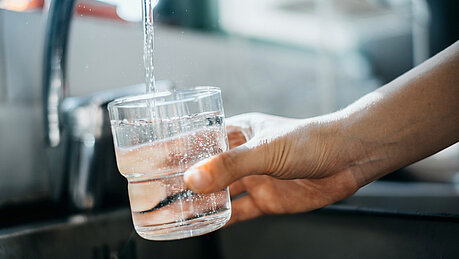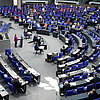Drinking Water
Provisions ensure drinking water quality level
The revised Drinking Water Ordinance (Trinkwasserverordnung ‒ TrinkwV) provides for the introduction of risk-based drinking water protection, introduces new parameters and sets lower limits for pollutants such as chromium, arsenic and lead. It requires the operators of water supply installations to disconnect or replace old lead pipes.
The revised Drinking Water Ordinance became effective on 24 June 2023. It transposes relevant requirements of the 2020 EU Drinking Water Directive into German law. The Drinking Water Ordinance continues to guarantee the accustomed high level of drinking water quality while focusing especially on new challenges in the form of environmental factors affecting drinking water resources.
Quality report published for the 2020 to 2022 period
The EU Drinking Water Directive (98/83/EC) requires all member states to submit a report on the quality of water for human consumption every three years. The obligation to report covers water supply zones (WSZ) that supply more than 1,000 cubic metres (m³) of drinking water per day or serve more than 5,000 persons. In Germany, 2,507 water supply zones are subject to this reporting obligation (as of 2022), distributing roughly 4.4 billion cubic metres of drinking water to approx. 89 per cent of the country’s population annually.
The drinking water in Germany’s water supply zones that are subject to the reporting obligation is of excellent quality. This was the conclusion of the seventh report, spanning the years 2020 to 2022, in which the Federal Ministry of Health (BMG) and the German Environment Agency (UBA) informed consumers about the quality of “water for human consumption” (drinking water).
The results of drinking water monitoring demonstrate that next to all microbiological and chemical limits and requirements specified in the Drinking Water Ordinance (TrinkwV) were complied with in upwards of 99 % of analyses carried out throughout Germany. For many quality parameters, it was as much as 99.9 to 100 %.
What does it mean if there is an exceedance?
The Drinking Water Ordinance stipulates limits for chemical and microbiological parameters that usually reflect the precautionary principle. If exceedances do occur, this may not be taken to mean that there is necessarily a hazard to health. This would depend on the parameter and the level and duration of the exceedance. For instance, the presence of coliform bacteria in drinking water indicates a general deterioration of water quality and hence the need for further testing to identify the root cause and initiate preventive measures for public health protection. Exceedances of the parametric value for lead, for example, are indicators of lead pipes remaining in the domestic distribution system or fittings that are not in line with the generally recognised codes of practice.
What happens if there is an exceedance?
If and when exceedances occur, identifying and eliminating the root causes takes precedence over addressing the symptoms. Therefore, the local public health office examines if the exceedance is a health hazard that calls for immediate remedial measures or if it can be tolerated temporarily until measures to eliminate the root cause take effect.
Contents of the Drinking Water Ordinance
Drinking water is the number one food item. In addition to drinking and food preparation, it is used for domestic purposes such as washing, showering and doing the laundry. In Germany, drinking water must satisfy stringent quality requirements. The Drinking Water Ordinance (TrinkwV), which transposes the EU Drinking Water Directive ‒ as most recently amended ‒ into national law, specifies these binding requirements. Its most basic provisions include that drinking water must not only be free from unsafe levels of substances and pathogens, but that it must also be 'pure and wholesome'.
Moreover, the Drinking Water Ordinance regulates the duties incumbent on the water suppliers and monitoring authorities; it specifies the microbiological, chemical and radiological parameters that must be tested for and the frequency with which drinking water must be monitored. In an effort to ensure the water's hygienic safety, the Ordinance also stipulates that limits and water quality requirements be met in household taps.
According to European provisions, the EURATOM Directive 2013/51, drinking water in Germany must be tested and monitored for any levels of radioactive substances. By way of the Third Amendment of the Drinking Water Ordinance, requirements for the measuring and monitoring of drinking water quality in respect of artificial and natural radioactive substances were stipulated in agreement with the Federal Environment Ministry. It stipulates, for instance, parametric values for radon, tritium, and the indicative dose including radon daughters.
While radiation exposure from radioactive substances in drinking water can be considered negligible in Germany on average, drinking water may have higher levels of natural radioactive substances locally on account of geological substrate characteristics. The provisions enhance the safety of drinking water in respect of these substances, since public health protection is paramount and the mandatory precautionary principle also applies to radiation protection.
Current version and citation of the Drinking Water Ordinance
The “Ordinance on the Quality of Drinking Water Intended for Human Consumption (Verordnung über die Qualität von Wasser für den menschlichen Gebrauch (Trinkwasserverordnung – TrinkwV) of 20 June 2023” revises the Drinking Water Ordinance of the same title of 21 May 2001 (essentially amended by six amending ordinances adopted in 2011, 2012, 2015, 2018, 2019 and 2021), transposing provisions of the 2020 EU Drinking Water Directive into national law. When citing the current version of the Ordinance on the Quality of Water Intended for Human Consumption (Verordnung über die Qualität von Wasser für den menschlichen Gebrauch), it can also be referred to using the official short title “Drinking Water Ordinance” (Trinkwasserverordnung) or its official German abbreviation “TrinkwV”. For the purpose of referring to a specific version of the Drinking Water Ordinance, the full citation is appropriate. For instance, the full citation of the current version reads as follows:
“Verordnung über die Qualität von Wasser für den menschlichen Gebrauch (Trinkwasserverordnung – TrinkwV) vom 20. Juni 2023 (BGBl. 2023 I Nr. 159, S. 2)” (Ordinance on the Quality of Water intended for Human Consumption of 20 June 2023 (Federal Law Gazette 2023 I No. 159 p. 2)) or “Trinkwasserverordnung (TrinkwV) vom 20. Juni 2023 (BGBl. 2023 I Nr. 159, S. 2)” (Drinking Water Ordinance (TrinkwV) of 20 June 2023 (Federal Law Gazette 2023 I No. 159 p. 2)).
Click here for the current version of the Drinking Water Ordinance in German (Original) | English
History
All ordinances amending the Drinking Water Ordinance
Functional responsibility in Germany
Responsibility on the federal level for the provisions and regulations governing drinking water quality lies with the Federal Ministry of Health. In fulfilling this task, it draws on the technical expertise of the German Environment Agency (UBA), with the latter’s “Drinking Water and Swimming Pool Water Hygiene” Department being subject to the Ministry’s operational oversight. The UBA’s tasks in the field of drinking water hygiene are stipulated in section 40 of the Protection against Infection Act (Infektionsschutzgesetz) and in the Drinking Water Ordinance.
Reports published by the German Environment Agency (UBA)
- Final report: Estimate of lead pipework remaining in use in Germany
- Seventh Report on Drinking Water Quality (2020-2022)
- Sixth Report on Drinking Water Quality (2017-2019)
- Fifth Report on Drinking Water Quality (2014-2016)
- Fourth Report on Drinking Water Quality (2011-2013)
- Third Report on Drinking Water Quality (2008-2010)
- Second Report on Drinking Water Quality (2005-2007)
- First Report on Drinking Water Quality (2002-2004)
Consumers who want to get information in addition to that included in the report can obtain details on the drinking water quality in their supply zone from their local public health office or water supplier.
Guidelines
-
Protection from radioactive substances in drinking water
on compliance with the requirements of the Drinking Water Ordinance in the testing and evaluation of radioactive substances in drinking water on the website of the Federal Ministry for the Environment, Nature Conservation, Nuclear Safety and Consumer Protection (BMUV)
Additional information
-
Press release (17 December 2020)
Europaparlament verabschiedet Neufassung der Trinkwasserrichtlinie (European Parliament adopts recast Drinking Water Directive)
-
Press release (06 November 2015)
Schutz vor radioaktiven Stoffen in Trinkwasser (Better protection from radioactive substances in drinking water)
-
Press release (18 November 2013)
water to become lead-free – new standard for lead in drinking water






























